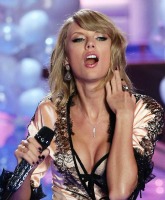PHOTOS Taylor Swift CoverGirl ad banned for too much Photoshopping
Consumer agencies around the globe are beginning to crack down on the use of Photoshopping in advertising and the latest victim in Procter and Gamble’s campaign for CoverGirl NatureLuxe Mousse Mascara, which features country music star Taylor Swift.
So what in the world could they have felt to need to Photoshop about the lithe and beautiful Taylor Swift? Did they think a virtual boob job was necessary? OR was it that skinny wasn’t skinny enough like the absurd Ralph Lauren fiasco from a couple years ago?
As it turns out, the Taylor Swift feature artificially enhanced was… her eyelashes? Ramping up eyelashes may seem like a rather silly thing to ban an ad over, but you have to remember this is an ad for mascara! So the issue wasn’t so much about unrealistic beauty standards as it was truth in advertising about what a particular product is actually capable of.
Here is a rough photo of the ad itself:

The director of the National Advertising Division, Andrea Levine, explained to Business Insider, “You can’t use a photograph to demonstrate how a cosmetic will look after it is applied to a woman’s face and then – in the mice type – have a disclosure that says ‘okay, not really.’”
The “okay, not really” disclosure came in the form of these words contained in the ad’s fine print: “lashes enhanced in post production.”
NAD was concerned that the ad “conveyed the implied messages that consumers who use Covergirl NatureLuxe Mousse Mascara would get lashes like those depicted in the advertisement and that the lashes depicted in the advertisement were achieved solely by using CoverGirl NatureLuxe Mascara, without post-production enhancement.”
Procter and Gamble have since pulled the ad and NAD seems content. Though not the first ad to be targeted by NAD, it is the first one from a major campaign.
The British Advertising Standards Authority recently pulled Lancome and Maybelline ads featuring Julia Roberts and Christy Turlington. From Styleite:
In Roberts’ ad, for Lancome’s Teint Miracle foundation, her skin appears categorically flawless, while Turlington’s ad for Maybelline’s The Eraser shows portions of her skin with and without the product. (The portions of her face that haven’t been, um, erased, show nearly imperceptible wrinkles and dark spots.)
And here is how L’Oréal, which owns both Maybelline and Lancome, tried to explain the Photoshopegery:
L’Oréal UK admitted that Turlington’s image had been “digitally retouched to lighten the skin, clean up makeup, reduce dark shadows and shading around the eyes, smooth the lips and darken the eyebrows”. However, it claimed there were still signs of ageing, such as crow’s feet, and that the image “accurately illustrated” the achieveable results.
So what about Axe body spray? I keep spraying myself and waiting for the bikini-clad women to pile on, but nothing seems to happen.




